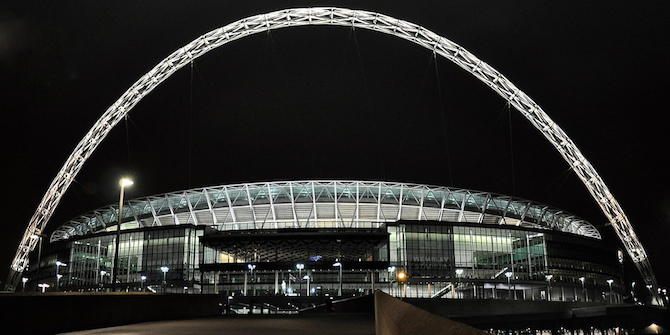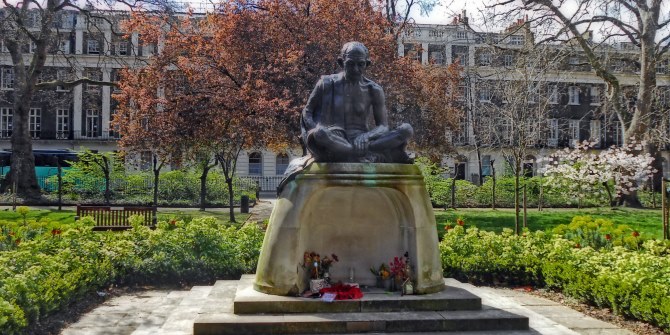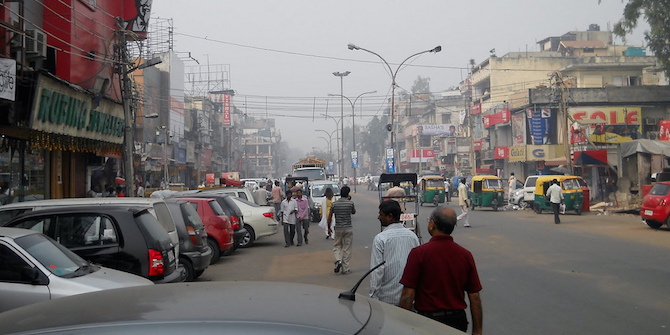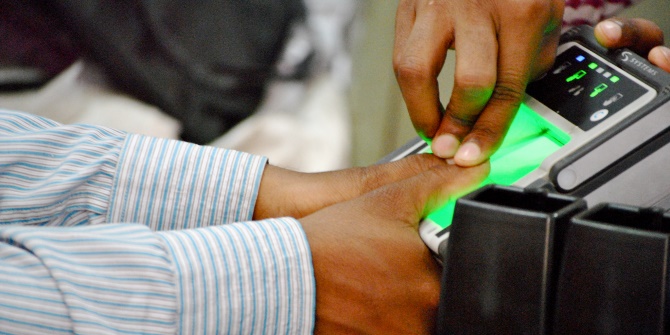 Mukulika Banerjee reflects on the Indian Prime Minister’s performance at Wembley Stadium last Friday. She writes that the 60,000 strong audience that turned out to see Modi speak during his visit to the UK wants desperately to believe India finally has a leader who will turn around the country’s fortunes and put an end to their sense of shame at its failings.
Mukulika Banerjee reflects on the Indian Prime Minister’s performance at Wembley Stadium last Friday. She writes that the 60,000 strong audience that turned out to see Modi speak during his visit to the UK wants desperately to believe India finally has a leader who will turn around the country’s fortunes and put an end to their sense of shame at its failings.
The coverage of Prime Minister Modi’s recent visit to the UK has included both stories of protests and accolades. The piece de resistance of the visit was undoubtedly the mammoth gathering at Wembley Stadium, organised by a private organisation, when a crowd of 60,000 assembled to mark the triumphant return of Modi to Britain after a gap of twelve years. “The UK has never stopped me from coming here, they have never banned me from coming here,” he told a press conference the day before when a Guardian reporter brought up the earlier British policy of keeping him out because of his role as Chief Minister during the pogrom against Gujarati Muslims in 2002. “Perhaps I could not come because of my own time constraints,” Modi said.
The majority of the audience in Wembley stadium on 13 November were Gujarati Hindus, self-confessed Modi fans who make up much of the Indian diaspora in the UK. They had worked hard for weeks in preparation and waited for hours in the numbing cold for the moment when their hero would finally appear in person, to give darshan to his bhakts. When the first image of Modi appeared on a giant screen, the stadium shook with the chants of roaring fans that continued to rise in hysteria until he finally appeared on the stage. If Wembley had a roof, it might have blown off at this moment.

Only the opening strains of ‘God Save the Queen’ quietened the crowd when, just as enthusiastically, they sang along. Images of the Prime Minister singing the Indian national anthem that followed drew loud cheers, as if a performance. The anthem conjured images of India’s harmonious diversity and civilisation, the very qualities so many in India fear are being threatened on a daily basis especially under the Prime Minister’s watch. But Narendra Modi, on his 29th overseas trip in 18 months in office, was here to court his fans, a very special demographic of the world’s population whose hearts he rules and whose wallets he hopes to open.
They are citizens of prosperous Western countries where they have seized opportunities and bettered their material lives, while preserving their Indianness in their food, festivals, views, entertainment, family and social lives. So far, India had been the place where their villages and towns of origin were located, and where they returned out a sense of duty and family. They loved India, but were embarrassed by its poverty, filth and lack of infrastructure and so they returned with a sense of relief to their cleaner, more efficient and prosperous lives in their adopted country.
This was the demographic of the fans at Wembley on Friday night. And Narendra Modi, the consummate politician, knew this. He knew he was addressing fans, not the citizens of India, just as he had at New York’s Madison Square Garden a year ago. This was not an audience that was concerned about humdrum daily news in India – of mob lynching and oppression of the precariat, of mass protests in Gujarat by their own impoverished caste members for reservation quotas to address the desperate state of unemployment or the BJP’s debacle in two major elections in 2015. Those were the concerns of the citizens of India who had a stake in the country. But the audience in Wembley were not voters but fans of Modi and like the fans of any failing football club that played in the stadium, they believed that Modi was the star player who would finally turn around the fortunes of their club.
To the delight of the fans, the player delivered on the night. He told them to ignore what they read in the press or saw on their television screens and to trust him instead. He addressed their worst fears and spoke about India’s poverty, corruption, filth and infrastructure. Each example received a roar of approval because it resonated with the source of their collective shame about their club, sorry, country. He spoke about the state of women’s education and lack of toilets. He spoke of 18,000 villages that still didn’t have an electricity tower. But, he also offered solutions – presenting each of them as his personal commitment to making India the country his fans no longer needed to be ashamed of. The names of his programmes were compelling, the slogans catchy, his tone reassuring – the fans could sense this could indeed be a winner, his transfer fee sounded like a good investment. They cheered and roared, filling the pauses in Modi’s speech with hysterical screaming and applause as they sensed victory in their lifetimes.
Fans are not citizens. They don’t care for accountability, for past careers or personal failings. They simply want results and they want them now. For this, they are willing to suspend disbelief and judgement and give their unconditional loyalty so long as triumph is assured. And Prime Minister Modi was able to assure them just that with the gift of oratory he has in abundance. He spoke of India’s rising pre-eminence in the global league, he conjured images of world leaders flocking to him in admiration and for advice, he promised India’s leadership on tackling terrorism and global warming. He thanked those who had maintained faith in India, including his hosts in Britain and those countries who had made India the destination for the manufacture of arms.
The Prime Minister spoke for over an hour, holding his fans in thrall as he evoked Gandhi, mourned the sorry state of Islam for having ignored its Sufi heritage and reminded the audience of the many reasons why they should love India. It was the performance of a consummate orator – he cracked jokes, shared anecdotes, asked them if they had had a good festive season, teased them, pausing strategically to sip water when he sensed another roar of ‘Modi! Modi!’ coming along. But above all, he flattered his fans so they no longer felt like a small community in a foreign land but the pre-eminent ambassadors of an ancient civilisation. And he gave them the winning goal too that got the loudest cheer of the night – the news that a direct flight service between London and Ahmedabad would be resumed next month.
As the fans trooped out of the stadium into the bitter cold night, their tricolour scarves wrapped round their necks, they felt warm and ten feet tall. Only time will tell if this was just another ephemeral good night of entertainment or the excitement of a love that lasts.
This article originally appeared on The Wire and is reposted with the editor’s permission.
Note: This article gives the views of the author, and not the position of the South Asia @ LSE blog, nor of the London School of Economics. Please read our comments policy before posting.
About the Author
 Mukulika Banerjee is Associate Professor of Anthropology at LSE.
Mukulika Banerjee is Associate Professor of Anthropology at LSE.








Modi bowled them over because the game was fixed. The referee David pronounced decisions made earlier.
“The Prime Minister ….holding his fans in thrall as he evoked Gandhi…..”.
But at home he maintains the iconic silence when Godse is deified!